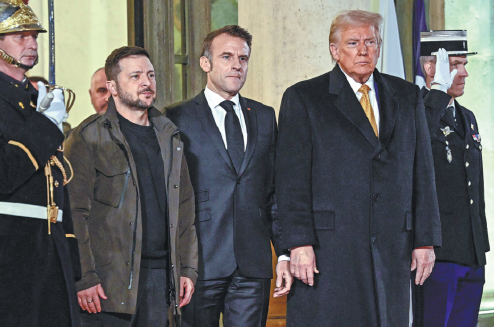EU faces unpredictable 'Trump 2.0'

Bloc struggling with new challenges, from Ukraine crisis to possible trade war, posed by US president-elect's 2nd term
When Donald Trump, president-elect of the United States, arrived in Paris on Dec 7 for the reopening of the Notre Dame cathedral, French President Emmanuel Macron greeted him with a grand welcome usually reserved for a sitting US president, with trumpets blaring and members of the French Republican Guard in full uniform.
A trilateral meeting of Trump, Macron and Ukrainian President Volodymyr Zelensky at the Elysee Palace was not on Trump's original schedule but was hastily added, making major headlines.
The scenes have been widely seen as Macron's bid to win favor from the 47th US president who will again occupy the White House on Jan 20, four years after his last term, which left a haunting memory for many Europeans.
A Dec 9 policy brief published by Bruegel, a major think tank in Brussels, stated that the return of Trump raises fundamental challenges for the European Union.
It warned that unilateral US actions could fatally weaken the three institutions critical for EU interests — NATO, the Paris climate agreement and the World Trade Organization. By threatening to raise tariffs against imports from EU and other economies, Trump's policies could have harmful effects on the EU economy.
"The EU's biggest concern is that Trump might reach a quick deal with Russia over the Ukraine crisis without even considering the EU's stance, political correctness and security concerns," said Ding Chun, director of the Center for European Studies at Fudan University in Shanghai.
Trump's election victory on Nov 5 was a huge disappointment for Europeans as a YouGov survey released on Nov 1 showed that the vast majority of Europeans wanted the Democratic candidate, US Vice-President Kamala Harris, to win. The favorability was as high as 81 percent in Denmark, 73 percent in Sweden, 71 percent in Germany and 62 percent in France, while only 6 to 15 percent in those countries preferred Trump.
However, European Commission officials expressed that the commission has been making preparations for a while for various scenarios of a Trump return.
Dealing with conflict
Trump has never talked about the details of how he will end the Russia-Ukraine conflict "within 24 hours "after taking office, a pledge he repeatedly made during presidential campaigns.
After the Elysee Palace meeting, Trump wrote on social media that there should be "an immediate ceasefire and negotiations should begin".
He told NBC's Meet the Press program on Dec 8 that Ukraine will possibly receive less military aid once he takes office. He also floated the possibility for the US to quit NATO, signaling that its participation during his next term cannot be taken for granted if other members do not live up to commitments on defense spending.
In an interview with Time magazine published on Dec 12, Trump criticized Ukraine's use of US-supplied missiles deep into Russian territory, saying "it's crazy what's taking place… We are just escalating this war and making it worse".
The words likely pointed at the Joe Biden administration's rapid surge in military assistance to Ukraine before Trump assumes office.
Last month, Trump announced that Keith Kellogg, a highly decorated, retired three-star general who served in his first term, will be his special envoy for Ukraine and Russia.
With a very different US administration on the horizon, Zelensky has made a major shift. He no longer talks about his "victory plan" that he promoted in October, which was neither endorsed by the US nor the EU.He has instead expressed willingness to accept territorial concession to end the conflict with Russia in exchange for NATO membership or a security guarantee.
Changes are also happening within the EU. German Chancellor Olaf Scholz on Nov 15 talked to Russian President Vladimir Putin on the phone for the first time in two years about a "just and lasting peace".
On Dec 11, Hungarian Prime Minister Viktor Orban, who met Trump two days earlier at the president-elect's Mar-a-Lago estate in Florida, held a phone talk with Putin about a possible political and diplomatic solution to the conflict.
Polish Prime Minister Donald Tusk, a former European Council president, said on Dec 11 that peace talks on Ukraine could start in the winter.
The EU's new top diplomat, Kaja Kallas, a former Estonian prime minister, has distanced herself from those leaders, insisting that Russia does not want those negotiations.
Known as a fierce Russia hawk, Kallas visited Kyiv on Dec 1, her first day on the job, saying the EU wants Ukraine to win. She also said that Europe needs to step up aid to Ukraine if the US withdraws funding.
NATO Secretary-General Mark Rutte, a former Dutch prime minister, called for more critical ammunition and air defense for Ukraine.
"We must provide enough support to change the trajectory of this conflict once and for all," he said, without saying whether that is about gaining more bargaining power at the negotiation table — an approach seen among some EU leaders.
Rutte said on Dec 12 that NATO will set a new spending target of 3 percent of GDP by 2030, compared with the current pledge of 2 percent met by all but eight members.
"It's time to shift to a wartime mindset," he said in his first major public speech since taking office on Oct 1.
Macron and Tusk, after meeting in Warsaw on Dec 12, insisted that Europeans must be involved in security talks in "very close" coordination with the US to ensure Europe's interests are taken into account.
The Russia-Ukraine conflict, which broke out on Feb 24, 2022, has been the most devastating on the continent since World War II.
As of November, the EU and its member states had provided nearly $133 billion in financial, military, humanitarian and refugee assistance to Ukraine. The bloc has recorded some 8 million Ukrainian refugees.
It has imposed 15 rounds of sanctions against Russia, the latest one adopted on Monday targeting the so-called shadow fleet — mainly gas and oil tankers — that Russia has been using to bypass the price cap set by the G7 and the EU in late 2022.
The EU has greatly reduced its dependence on cheap Russian energy, especially the natural gas from Baltic pipelines, and has replaced it with more expensive LNG from the US and other countries.
However, the efforts have seen a reversal lately with the EU expected to import about 10 percent more LNG from Russia this year than last, according to commodities data platform Kpler. The bloc also bought fuel worth almost 20 percent more than it did last year from three major Indian refineries working on Russian crude oil, according to the Center for the Study of Democracy in Bulgaria.
The higher energy prices have worsened the crises of rising living costs and deindustrialization, especially in the EU's largest economy Germany. The Kiel Institute for the World Economy indicated that the German economy will stagnate next year following two consecutive years of contraction.
Elie Tenenbaum, director of the Security Studies Center at the French Institute of International Relations in Paris, and Leo Litra, a senior fellow at the New Europe Center in Kyiv, argued that if the upcoming US administration follows through on Trump's pledges, the outcome will have sweeping ramifications.
"Europeans — including Ukrainians — cannot be left out of the discussions that will determine their future. Resolute European countries must now come together to form a coalition, claim a seat," they wrote in Foreign Affairs magazine on Dec 3.
Mark Leonard, director of the European Council on Foreign Relations, said Europeans have every reason to fear that Trump's proposed "peace plan" for Ukraine will deprive that country of its territorial integrity and leave it demilitarized and permanently excluded from NATO.
"And NATO itself may well go 'dormant' with America radically reducing its participation and handing responsibility for the alliance's military command and resources over to the Europeans," he wrote on the council's website.
Taking on tariffs
The economic scenarios are even scarier, Leonard said, and if Trump keeps his promise of levying across-the-board import tariffs, a trade war between the EU and its biggest export market is inevitable.
"In a world where geopolitics and geoeconomics are increasingly intertwined, the bloc should prepare countermeasures against the US and seek to expand trade with the rest of the world," he said.
Ignacio Bercero, Petros Mavroidis and Andre Sapir, three Bruegel research scholars, echoed the view. In an article on Dec 9, they argued that if Trump pushes forward with his tariff threats, the US would be ignoring its WTO commitments and would also roll back the substantial liberalization that has taken place during the past 80 years, with a potentially major negative effect on the world economy.
Most Europeans still remember the tit-for-tat tariff war during Trump's first term in 2018 when the US imposed tariffs on steel and aluminum around the world. The EU retaliated by imposing hefty tariffs on Harley-Davidson, Zippo lighters, Levi's jeans and Kentucky bourbon.
In 2018, Trump described EU-US trade as "very unfair" and warned that his many problems with Brussels "may morph into something very big". He also accused German cars of posing a national security threat.
Ruben Dewitte and Inga Fechner, two economists at Dutch bank ING, pointed out that protectionist measures may strain EU-US trade relations in the longer term, further eroding the EU's struggling manufacturing sector.
They noted that Trump's second term hits the European economy at a much less convenient moment than the first term when the European economy was relatively strong.
"This time around, it is experiencing anemic growth and is struggling with a loss of competitiveness. A looming new trade war could push the eurozone economy from sluggish growth into recession," they wrote on the ING website.
The US is the EU's largest trading partner as of last year, with total trade of goods hitting $925 billion, a surplus of nearly $173 billion for the bloc.
Lai Suetyi, an associate professor at the Center for European Studies at Guangdong University of Foreign Studies, told China Daily that the EU is worried about "Trump 2.0", citing the many discussions, debates and media coverage going on in the past months regarding his second presidential term.
The EU has started preparing for these months ago, Lai said, adding that the European Commission has set up a team to face the new US administration. But Trump's unpredictable nature makes preparations on how to deal with him difficult, she added.
"These are bad news for the EU, which has already had economic difficulties," Lai said.
The EU's two largest economies, Germany and France, are haunted by domestic political and economic chaos. Scholz's coalition government has collapsed and he lost a confidence vote on Monday in parliament, paving the way for snap elections on Feb 23 that he is most likely to lose. In France, Macron nominated Francois Bayrou as the new prime minister last week, succeeding Michel Barnier, who was ousted in a vote of no confidence on Dec 4.
Julian Hinz, research director for trade policy at the Kiel Institute for the World Economy, suggested that to avoid an escalation, the EU could present a proposal for a trade agreement with the US that is limited to individual sectors. Meanwhile, the EU should diversify its trade relations and quickly be able to defend itself militarily without US help in order to strengthen its negotiating position.
"Maintaining the global trade order must also be the EU's top priority. A collapse of the WTO would hit the EU much harder economically than US tariffs. Trump's announcement shows how important it is for the EU to act strategically and cohesively, with all member states speaking with one voice," Hinz said.
Sabine Weyand, director-general for trade at the European Commission, told a recent seminar that what the EU has been doing and continues to do is "analyze all possible announcements so that we can prepare for scenarios".
"Our default approach is to say we are interested in a cooperative agenda, with whoever sits in the White House. We are also prepared for disruptive scenarios," she said.
She added that "there is a whole world out there that does not want to choose camp" and the US market accounts for only 15 percent of the world's imports.
Affecting ties
While some suggested that the EU should try to please the China hawks in the Trump administration to get tough on Beijing so that the president-elect might spare the bloc, John Clarke, a former EU trade negotiator, said he hopes that the EU will not be forced to choose between the US and China.
"I think the EU is big enough not to do that," he said in a recent forum in response to a China Daily question.
"I'm quite sure the European Union will continue in the next four years to trade and invest heavily in the US and to trade and invest heavily with China.
"The EU and China are going to be very, very important partners in the next decades," he said, citing the 2.3 billion euros ($2.4 billion) daily trade between the two sides.
Denis Depoux, international managing director of Roland Berger, a consulting firm, predicted that the EU will be more important for Chinese companies because of US market restrictions.
He said that if Trump hits Chinese companies, it should pave the way for a more positive relationship between China and the EU.
"Therefore, the EU and China need to write a new page for their economic relationship," he told China Daily. Roland Berger has worked with the China Chamber of Commerce to the EU in the past five years in publishing an annual survey of Chinese companies in the bloc.
Depoux expressed hope that the EU and China can resolve their electric vehicle dispute through negotiations, which will serve as a good example for EU-China relationship going forward.
China and the EU are continuing their talks, hoping to reach an agreement based on minimum price commitments after the EU slaps countervailing duties on Chinese EV imports.
Ding from Fudan University said Trump 2.0 poses both challenges and opportunities for China-EU relations.
He said Trump's trade policy against both China and the EU will also hurt European companies engaged in trade and investment with China.
"This might encourage more contacts between the EU and China as a boost to bilateral relations," he said.
"On the other hand, we cannot exclude that the EU will to some extent try to win favor from China hawks in the Trump team for mercy for the EU from the US administration," he said, adding that the bloc will not go too far down that path for fear of backlash at home.
chenweihua@chinadaily.com.cn

























